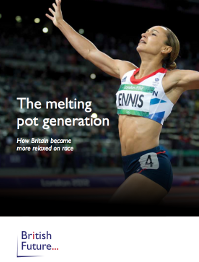Into the melting potPosted in Articles, Census/Demographics, Media Archive, Social Science, United Kingdom on 2014-02-11 05:15Z by Steven |
The Economist
2014-02-08
The rapid rise of mixed-race Britain is changing neighbourhoods—and perplexing the authorities
ZADIE SMITH, a novelist born to a black Jamaican mother and a white British father, recently recalled that when she was growing up in Willesden Green, a London district with a large immigrant population, “nothing could be more normal than a mixed-race girl”. The surprise, she said, was entering publishing and finding that people thought it unusual. Nobody could get that impression now: Britons are mixing at extraordinary speed.
The 2011 census revealed a country that is decreasingly white and British: England’s ethnic-minority population grew from 9% of the total in 2001 to 14%. But the biggest single increase was in the number of people claiming a mixed-ethnic background. This almost doubled, to around 1.2m. Among children under the age of five, 6% had a mixed background—more than belonged to any other minority group (see chart). Mixed-race children are now about as common in Britain as in America—a country with many more non-whites and a longer history of mass immigration.
As Britain’s mixed-race population swells, another group appears destined to shrink. The Labour Force Survey reveals that 48% of black Caribbean men and 34% of black Caribbean women in couples are with partners of a different ethnic group—with higher proportions still among younger cohorts. Black Caribbean children under ten years old are outnumbered two-to-one by children who are a mixture of white and black Caribbean.
Rob Ford of Manchester University points out that Caribbean folk are following an Irish pattern of integration, in that their partners are often working-class. The Irish parallel also suggests they will eventually be fully absorbed into the British population. Polls show that adults who are a mixture of white and black Caribbean tend to see themselves not so much as black, Caribbean or even as British, but rather as English—the identity of the comfortably assimilated.
Indians, who began arriving in large numbers in the 1960s, were slower to mix. They are now doing so—but along Jewish, rather than Irish, lines. For them, assimilation follows education: according to research by Raya Muttarak and Anthony Heath, Indians with degrees are far more likely to marry whites. Indians are not so much marrying into the white majority as into its suburban middle class, says Shamit Saggar at the University of Essex…
Read the entire article here.
